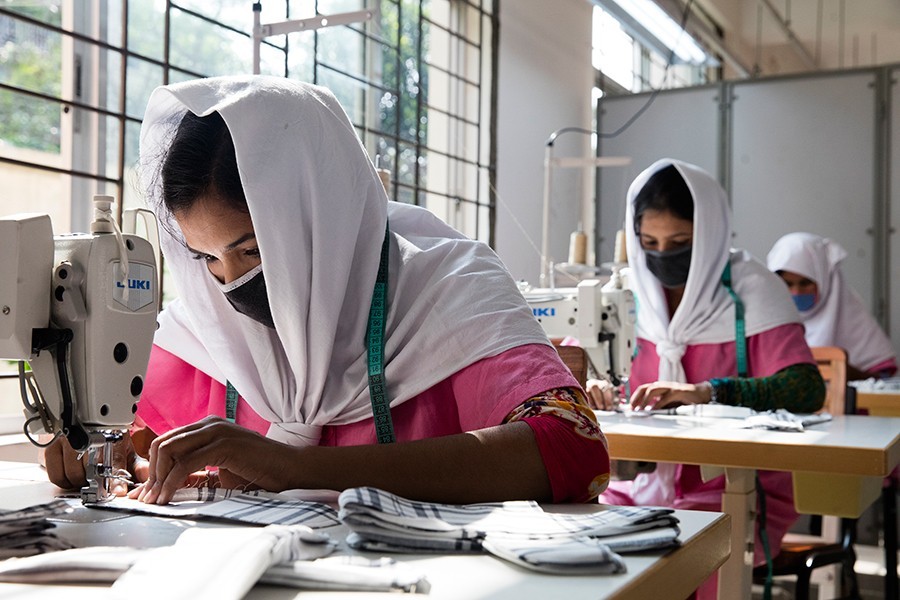
Published :
Updated :

The apparel makers are facing new challenges as the buyers changing their prices and order strategies, including product specification, after the FoB price is locked amid the ongoing Covid-19 pandemic, according to a latest report.
The buyers' high-pressure strategies, suppliers reported, have the most impact on the suppliers' business profitability and threatened the latter's social and environmental sustainability, it showed.
New pricing and ordering strategies emerging since the onset of the COVID-19 crisis have highlighted the financial hardship the industry continued to face - as well as the prevailing strategy of offloading financial pressures onto the suppliers.
The report titled 'Cost and Cost Negotiation and the Need for New Practices' by Better Buying was published on July 30, focusing specifically on cost and cost negotiation practices.
The report aimed to identify how business practices were being shaped by COVID-19, share emerging best practices for improving purchasing practices, and discover which practices suppliers want to see become part of minimally acceptable industry standards in the future.
Some 147 suppliers from 30 countries including Bangladesh, China, Hong Kong, India and Pakistan participated in the survey conducted during the period from June 25 through July 13, 2020.
Better Buying Institute, a non-profit organization that conducts scientific research and education, examined the way of business between buyers and their suppliers was carrying out on a day-to-day basis, aiming to transform the purchasing practices to support decent working conditions and reduce environmental impacts of production.
"Some buyers are using planning and forecasting, design and development, and other types of business practices beyond cost negotiations to secure lower costs and create win-win solutions with their suppliers," the report reads.
On an average, 3.3 strategies were used by each buyer, with the most common strategies being take it or leave it - meet the target cost or supplier cannot win the order, demanding level prices be maintained from year to year - no consideration for inflation and demanding across the board price cuts from previous orders/years.
Most suppliers or 93 per cent, however, reported that their buyers have started placing new orders since the onset of COVID-19.
The most frequently reported changes to buyers' pricing and ordering strategies included an overall decrease of order volume relative to previous orders or season's (59 per cent reported), smaller volumes at the same price (51 per cent) and lower target prices from previous orders (40 per cent).
About 69 per cent of suppliers participating in the survey believed that there should be minimally acceptable costing practices for the buyers.
Around 90 per cent suppliers pressed for providing a reasonable target price, 85 per cent opined to not requesting price reductions after an order is placed or shipped and 84 per cent demanded avoiding making changes to order details once the price is confirmed as the highest priority practices to implement as standards.
"These priorities are not unreasonable-in fact, it is hard to understand why they aren't already in standard practices," Kelly Allen, Strategic Partnerships Manager for Better Buying TM said in a statement.
Listening to suppliers and working with them toward win-win solutions could help raise the bar for how costing is carried out, eliminating impossibly low target prices and the high-pressure cost negotiation strategies needed to reach them, Kelly Allen added.
When asked, Mohammed Hatem, senior vice president of Bangladesh Knitwear Manufacturers and Exporters Association (BKMEA) agreed with the report findings about price pressures.
He alleged that the buyers were frequently asking for changes or adding extra works in the products, but at the same time they are not paying additional prices for the additional work.
At one point, the buyers were checking social compliance issues while reluctant to offer fair price for the products to ensure the compliance like minimum wages and others, he said, terming the buyers' such practices as 'unethical business practices'.
Munni_fe@yahoo.com


 For all latest news, follow The Financial Express Google News channel.
For all latest news, follow The Financial Express Google News channel.